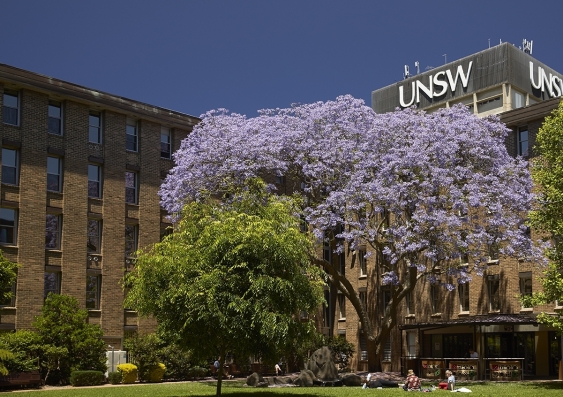Pioneering UNSW experts in clean energy and mental health elected to Australian Academy of Science
2025-05-22T07:00:00+10:00

The two new UNSW Fellows of the Australian Academy of Science, Professor Xiaojing Hao and Professor Helen Christensen.
Photo: UNSW
Professor Xiaojing Hao is an international leader in developing environmentally friendly, thin-film solar cells, and Professor Helen Christensen is known for her groundbreaking digital mental health research.
Two UNSW Sydney researchers – international solar energy expert Scientia Professor Xiaojing Hao and digital mental health leader Scientia Professor Helen Christensen – have been elected 2025 Fellows of the Australian Academy of Science for their outstanding contributions to their fields.
They are among 26 researchers announced as members of the Academy today.
Using tech to transform mental health interventions
Scientia Professor Helen Christensen from UNSW Medicine & Health and the Black Dog Institute has devoted her career to investigating how technology can better provide psychological treatment.
In 2000, she developed MoodGYM, a digital program to help reduce depression in young people, which has been used by millions in over 160 countries.
Prof. Christensen served as Executive Director and Chief Scientist at the Black Dog Institute from 2011 to 2021. Her suicide prevention model has been integrated into both federal and state mental health plans, and her work on digital phenotyping – using passive data from smartphones to monitor a person’s mental health – has been world-leading.
Prof. Christensen said she was thrilled that the Academy has recognised her and her field of psychology.
“Our approach to mental health issues has exploded. We now recognise that mental ill health is contributed to by factors as broad as the social determinants of health and as specific as neurochemical changes in cells in the brain. If we are to fully understand this complexity, we need more cross-disciplinary collaboration,” she said.
Prof. Christensen said science-backed mental health websites have been shown to improve anxiety and depression and can be delivered freely to people who want them.
“The world is moving fast. New technologies that were not even envisaged 20 years ago now transform mental health treatment and improve the lives of people in all corners of the world,” she said.
With more than 25 years of work on therapeutic websites, apps for youth depression and smartphone-based digital data, Prof. Christensen said she was excited by the potential of artificial intelligence in addressing mental health.
The field is wide open. We don’t know what can be done, but we do know that we should be investing fast in new AI-driven research and new young researchers from multiple disciplines.
UNSW Dean of Medicine & Health Cheryl Jones said Prof. Christensen’s accessible, evidence-based approach has helped millions worldwide.
“Mental health support is vital for so many people. Prof. Christensen’s research has significantly influenced mental health care practice in Australia and internationally. I congratulate her on being acknowledged by the Academy for this contribution,” she said.
Making solar cells cheaper, greener and more efficient
Scientia Professor Xiaojing Hao is driven to squeeze more electricity out of sunlight.
Her team at UNSW Engineering leads cutting-edge research to make solar panels more efficient, affordable and sustainable – and translate those results to industry.
Over the past decade, Prof. Hao has emerged as a world leader in her field. She initiated a new line of research in photovoltaics (PV) at UNSW, using emerging, earth-abundant and non-toxic thin-film material known as ‘sulphide kesterite’ (or copper tin zinc sulphide) to develop next-generation solar cells.
She has since set five world records for kesterite solar cell efficiency. In 2017, her team was the first to surpass 10% energy conversion efficiency for this type of solar cell, achieving a conversion rate of 11%.
Prof. Hao said the world needs to accelerate the adoption of photovoltaics to transition to clean energy.
“I’m driven by the challenge of pushing the boundaries of photovoltaic technology and delivering meaningful scientific breakthroughs and progress for all,” she said.
Prof. Hao’s current research is focused on developing affordable, high-efficiency thin film solar cells that can be used on their own or paired with traditional silicon solar cells to form a tandem solar cell.
What excites me most about the future of photovoltaics is not just the pace of innovation within the field, but its growing potential to power the future.
“As costs continue to fall and efficiency rises, we’re seeing PV move far beyond utility-scale power. It’s enabling clean hydrogen production, transforming traditional industries such as mining and transport, and even being integrated into buildings and consumer products. It’s incredibly energising to be part of a field that will fundamentally reshape how we produce, consume, and think about energy across all sectors,” she said.
Prof. Hao said it was an incredible honour to be elected as a Fellow of the Academy of Science.
“I feel deeply humbled to be recognised alongside so many scientists whose work I admire. I also truly acknowledge the dedication of my talented students, research fellows, collaborators, and mentors I’ve been fortunate to work with. This recognition belongs just as much to my team and mentors as to me,” she said.
UNSW Dean of Engineering Professor Julien Epps congratulated Prof. Hao on her fellowship.
“This fellowship honours the decades of exceptional and impactful research Scientia Prof. Hao has made in thin-film photovoltaics, including establishing Australia’s leadership in this field,” he said.
“Her work is critically important in improving renewable energy generation to tackle climate change, and I have no doubt she will continue to build on this as a member of the Academy.”
For a full list of the newly elected fellows, visit the .��
Media enquiries
For enquiries about this story please contact Julia Holman.
Tel: +61 435 124 673
Email: julia.holman@unsw.edu.au







